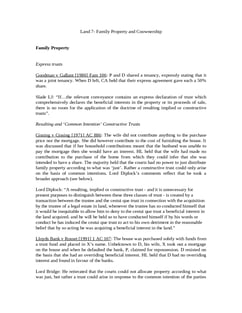NRAM Ltd v Evans [2018] 1 WLR 639
Judgement for the case NRAM Ltd v Evans
Table Of Contents
KEY POINTS
The determination of whether there had been a mistake depends on the moment when the entry is made or deleted.
A mistake could encompass various scenarios, including actions that the registrar would not have taken had they known the true facts at the time of entry or deletion.
Referring to Megarry & Wade, The Law of Real Property 8th ed.:
What constitutes a mistake is widely interpreted and is not confined to any particular kind of mistake. It is suggested therefore that there will be a mistake whenever the registrar would have done something different had he known the true facts at the time at which he made or deleted the relevant entry in the register, as by:
(1) making an entry in the register that he would not have made or would not have made in the form in which it was made;
(2) deleting an entry which he would not have deleted; or
(3) failing to make an entry in the register which he would otherwise have made.
LJ Kitchin, [59]:
A voidable disposition is valid until it is rescinded and the entry in the register of such a disposition before it is rescinded cannot properly be characterised as a mistake.
FACTS
Mr. and Mrs. Evans applied for a mortgage from Northern Rock in 2004 to buy a property. They were offered a loan, secured by a legal charge on the property, along with an unsecured loan. They accepted the offer, and this became the "2004 loan." They signed a mortgage deed that included Northern Rock's standard mortgage conditions, which allowed for further advances but did not obligate Northern Rock to make them.
In 2005, due to financial difficulties, Mr. and Mrs. Evans requested to consolidate their loans into a single account. Northern Rock offered them a new loan, which they accepted, and this became the "2005 loan." However, no change was made to the Land Register at this time.
Both Mr. and Mrs. Evans faced financial troubles and entered into individual voluntary arrangements (IVAs) with their creditors, including the bank. They continued to make repayments on the secured component of the 2005 loan.
In 2014, they discovered an error in the Land Register, which suggested that the 2004 loan had been redeemed in 2005 when, in fact, it was the 2005 loan that had been repaid. The bank acknowledged the mistake, rectified it, and registered a notice of its interest in the property.
Mr. and Mrs. Evans then initiated legal proceedings against the bank, seeking the sale of the property, the removal of the bank's notice, costs, and damages. Simultaneously, the bank initiated proceedings to rescind the erroneous discharge and rectify the Land Register.
JUDGEMENT
Appeal dismissed.
COMMENTARY
The case of NRAM Ltd v. Evans is important because of the consequences it has for real estate law, land registration, and the correction of inaccuracies in government records.
The case brought to light the legal ramifications of inaccurate Land Register entries, notably in connection to the legitimacy and priority of mortgages.
It stressed how crucial it is to keep property records accurate and thorough.
For Further Study on NRAM Ltd v Evans

From the AuthorContract law notes fully updated for recent exams at ...
Need instant answers? Our AI exam tutor is here to help.
Ask questions 🙋 Get answers 📔 It's simple 👁️👄👁️
Our AI is educated by the highest scoring students across all subjects and schools. Join hundreds of your peers today.
Get StartedSimilar Cases
Related Product Samples
These product samples contain the same concepts we cover in this case.
| Contract Law | Mistake And Frustration Notes (18 pages) |
| Land Law | Registration Theory Notes (39 pages) |

